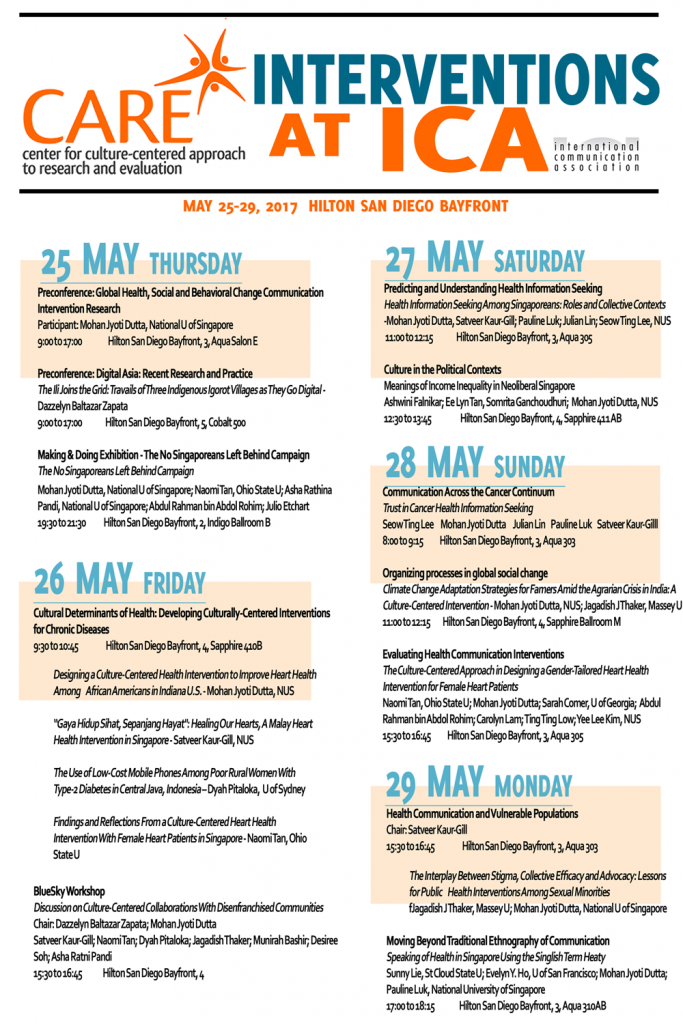
ICA Bluesky Workshop: Discussion Group on Culture-Centred Collaborations With Disenfranchised Communities
Many communicative interventions are exceedingly top-down wherein organisations already have a standard formula of intervention to achieve desired outcomes. Often, these interventions are intrusive to a community’s culture and does nothing more than provide temporary solace, if at all.
The ICA Bluesky Workshop is all about community-driven interventions that put community members and their needs front and centre. The workshop attempts to answer two important questions:
- What does it mean when a community and their culture is in direct dialogue with the intervention that is supposed to transform their lives?
- What does a culture-centred intervention look like?
We invite scholars, activists and practitioners who are involved in similar projects to have a fruitful and learning workshop with us on 26 May, 15:30 – 16:45, at Hilton San Diego Bayfront.
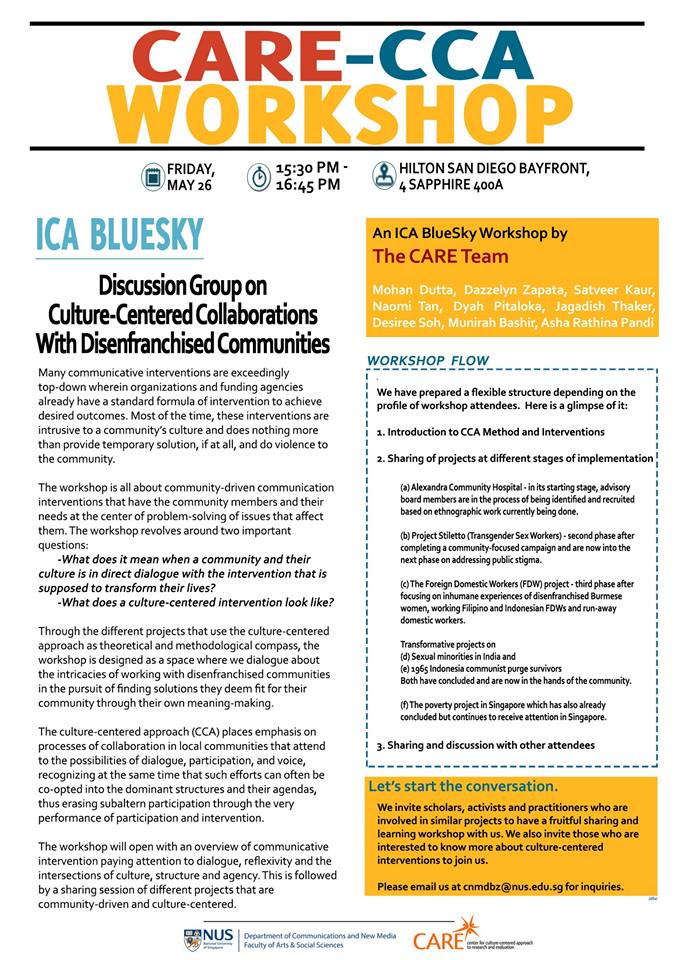
The Voice of Hope – Remembering the past and Recrafting the future
The Center for Culture-Centered Approach to Research and Evaluation (CARE), a research center under the Department of Communications and New Media at the National University of Singapore, is launching an online campaign on the 4th July to co-create stories of resilience, hope, and healing with the survivors of the Indonesian mass killings of 1965/1966. Based on scripts created by community members, the campaign seeks to create a narrative entry point for articulating the lived of experiences of sufferings and the pathways of hope. This online campaign titled “Learning65” celebrates the possibilities of hope amid suffering. Voices of hope come in various forms of stories and articulate the human rights, health and wellbeing issues faced by the survivors of the mass killings. After more than 50 years, the community members struggle to fight for justice amid the human rights violations under the New Order regime, which included mass killings, forced disappearances, sexual harassment, forced labor, imprisonment without trial, and many others. Community members share experiences of trauma, recounting physical torture, sexual harassment, and ongoing stigma. Voices of the victims have been systematically erased from the discursive space.
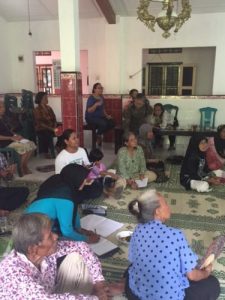
This online campaign was conceptualized by an advisory committee comprising 10 men and women from the community of 1965 survivors. Guided by the tenets of the culture-centered approach (CCA) pioneered by Center Director, Professor Mohan J. Dutta, this research study began with the understanding that community members are their own best problem configurations and solution providers. Therefore, when spaces for listening are created and communities are invited as co-participants, solutions to their health and well-being emerge from their lived contexts offering entry points for addressing trauma and suffering.
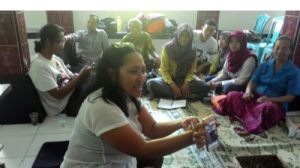
Over the 8 month-period, the advisory board identified key issues faced by the community of survivors and developed communicative solutions to tackle these problems. Stigma, restrictions to gather and to express thoughts, inequality, and communicative inaccess, are some of the problems that the community members face in their everyday lives. In collaboration with the NUS research team, the advisory board designed the campaign and the key messages in the collaterals. The media campaign developed by the community will include a dedicated digital story telling website, social media outreach, and a documentary research film.
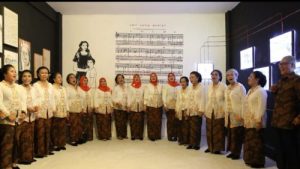
Besides the media campaign, the advisory committee also highlighted that a key element in building collective consciousness about the history and the 1965 tragedy, and enacting positive changes in their lives was to engage with the key stakeholders in solution-making. In line with this, two focus group discussions and peer leader meetings were organized, bringing together the younger generations, volunteers, artists, scholars, and activists. The community highlights the importance to engage with the younger generations through arts and performance to battle the stigma, and to address the erasures experienced by the victims and their family members for more than 50 years. The outcomes of the discussion and the solutions proposed will be summarized in two White Papers. The culture-centered campaign foregrounds voices of the the marginalized community of 1965 in creating a narrative entry point for health and wellbeing. The full White Paper will be available online at: http://www/care-cca.com/. To find out more about culture-centered approach, please visit http://www/care-cca.com/ CONTACT INFORMATION: Prof Mohan J. Dutta (cnmhead@nus.edu.sg) Dr. Dyah Pitaloka (cnmpd@nus.edu.sg)/ (itareksodirdjo@gmail.com)
[2 Talks and A Workshop] Dr Shaunak Sastry and Dr Zhuo Ban
We are excited to have Dr Shaunak Sastry and Dr Zhuo Ban with us this week and we would like invite you to their talks and workshop. Please see the details of the speakers, talks and workshop below. See you there!
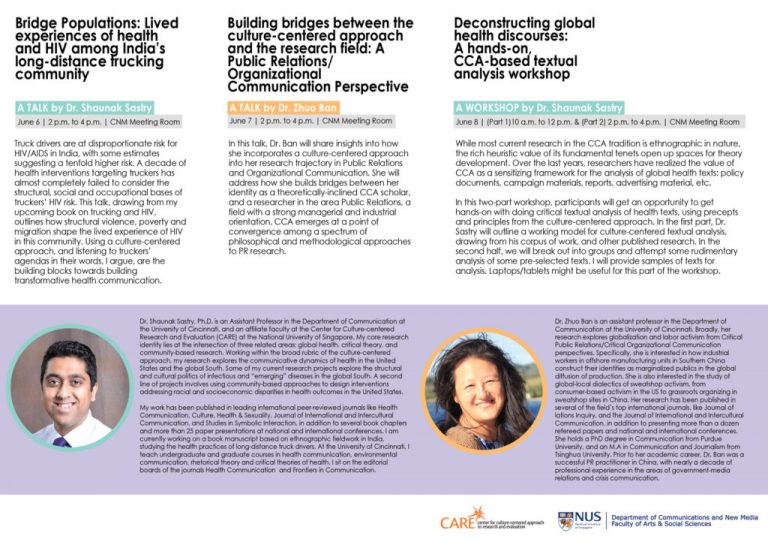
[CARE Documentary Screening] “Cotton for my Shroud” by Kavita Bahl and Nandan Saxena
Join us for the screening of an award-winning documentary film, Cotton for my Shroud, by Kavita Bahl and Nandan Saxena on 1 June (Wednesday), from 2.00 – 4.30 pm, at the CNM Playroom. This event includes the film screening, followed by a Question and Answer session with the filmmakers. The film focuses on the farmer suicide crisis in India, situating this within the wider neoliberal context of governance in India that has shaped the agricultural industry. If you are interested in attending this event, do register at the following link: http://goo.gl/forms/KTSgiu0w0hWXTgSA3 See you there!
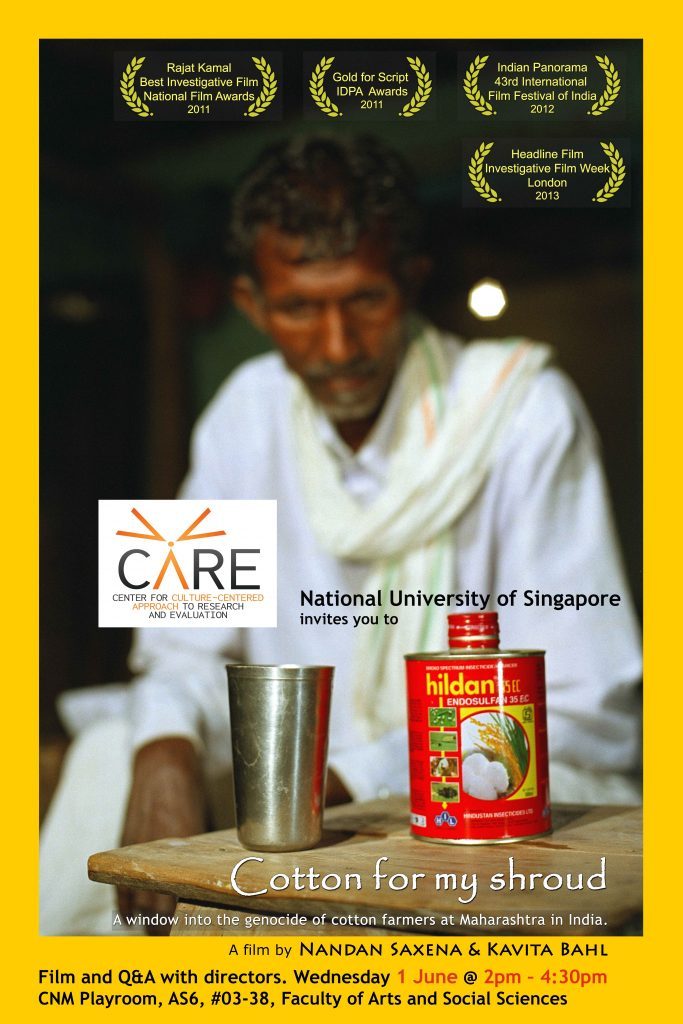
Fortifying Migrant Workers in Singapore
With our “Respect Our Food Rights” campaign launched last year, we partnered with DSM and BOP Hub to address the micronutrient deficiencies faced by our Migrant Construction Workers in Singapore due to the poor quality meals they received. This video below showcases the soft launch of the ‘45Rice’ project in delivering micronutrient-rich rice to this migrant community and eventually the wider public at large in Singapore. The concept of “Hidden Hunger” is introduced and they addressed the issue through the strategy of producing and supplying this micronutrient-rich rice. Our Director, Prof Mohan Dutta, was present to give his insights about the event and the fortified rice that was served.
[DAY03] Communication for Social Change: Intersections of Theory & Praxis
For the final day of our conference, we had a plenary by Dr. Raka Shome and Dr. Ambar Basu on the topic of “Open Dialogue on Subalternity” and one in the afternoon with our collaborators from HOME and Project X addressing the topic on “Academic-Activist Partnerships in Creating Spaces for Social Change”. We also had 2 panel sessions where the presenters shared their research work on the themes of “Communicating for Social Change” and “A Culture-Centered Approach to Social Change”. We ended the conference with a closing keynote by Mr P.V. Satheesh from the Deccan Development Society.
Plenary 03 – Open Dialogue on Subalternity
Panel 03 – Communicating for Social Change: In Action
Plenary 04 – Academic-Activist Partnerships in Creating Spaces for Social Change
[DAY02] Communication for Social Change: Intersections of Theory & Praxis
For the second day of our “Communication for Social Change: Intersections of Theory & Praxis” conference, CARE had the honour of having Professor Collins O. Airhihenbuwa as the opening keynote speaker along with Dr. Ambar Basu and Professor Barbara Sharf to deliver the plenary sessions. We also had 2 different panel sessions on “Theoretical Articulations of Social Change” and “Social Change Methodologies” presented by different speakers from around the region.
Leadership for Social Justice in Global Health Communication: Why Culture Matters
Plenary 01 – Culture-Centered Method: Postcolonial Interrogations
Panel 01 – Theoretical Articulations of Social Change
Plenary 02 – Gun Violence as a U.S. Public Health Concern: A Case of Narrative Inattention
Panel 02 – Social Change Methodologies
STORIES OF LABOUR – Celebrating May Day
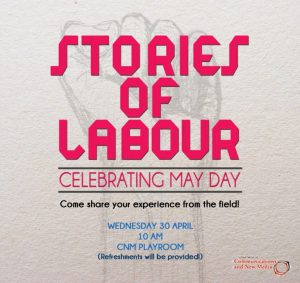
‘Films for Social Change’: Screening of “Wira Pdika” by Samarendra Das
Join us on 24 October for a captivating journey through the heart of Orissa’s tribal communities with a 120-minute screening of “Wira Pdika.” This poignant documentary unveils the staggering discrimination and injustices faced by these resilient communities at the hands of large mining and metal industries. Following the screening, engage in a Q&A session with filmmaker Samarendra Das and CARE director Prof. Mohan Dutta, as they illuminate the Adivasi struggle for justice and amplification of their voices.
Films for Social Change is an initiative by the Center for Culture-Centered Approach to Research and Evaluation (CARE), a health communication research centre based in the National University of Singapore.
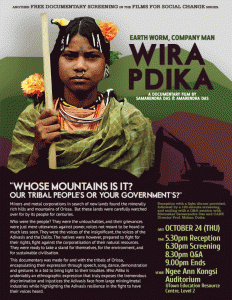
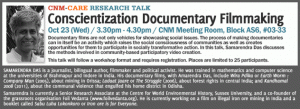
To register for either or both events, please click here. Brought to you by CARE, with kind support from UTown Residence.
You can find more information on Prof Dutta’s research work here.
